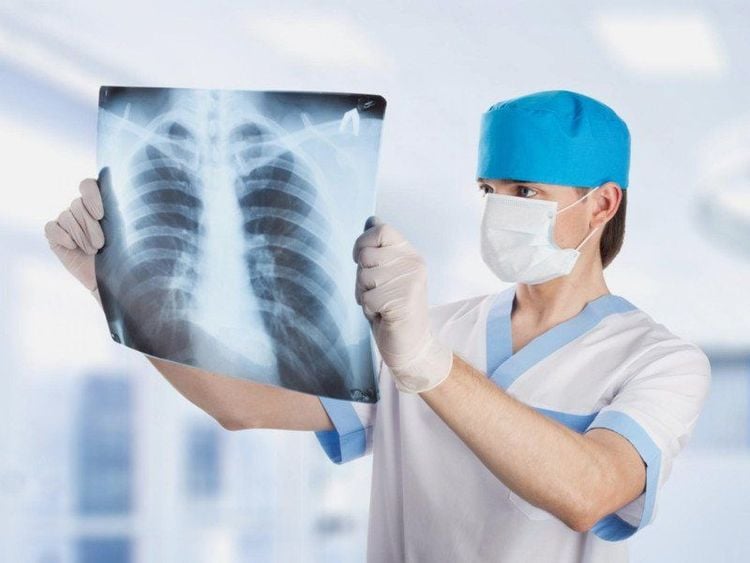This is an automatically translated article.
Posted by Master, Doctor Mai Vien Phuong - Department of Examination & Internal Medicine - Vinmec Central Park International General HospitalLung cancer is a dangerous disease commonly found in people who smoke or are often exposed to toxic environments. Metastatic lung cancer is a life-threatening condition. Therefore, it is necessary to diagnose and find timely treatment methods for metastatic lung cancer.
1. Stages of lung cancer
The stage of lung cancer helps determine where the tumor is, its size, and how far the cancer has spread. Understanding your own cancer stage is also an important part of deciding on the most appropriate treatment option. Refer to the article below to know more about the stages of lung cancer,MORE: Stages of lung cancer
2. What is metastatic lung cancer?
As cancer grows, it usually forms in one area or organ of the body. This area is called the main site. Unlike other cells in the body, cancer cells can break away from their primary site and travel to other parts of the body.Cancer cells can travel through the body through the bloodstream or the lymphatic system. The lymphatic system is made up of vessels that carry fluid and support the immune system. When cancer cells move to other organs in the body, it is called metastasis.
Cancer that has spread to the lungs is a life-threatening condition that develops when cancer in another area of the body spreads to the lungs. Cancer that develops in any primary site can form metastatic tumors.
These tumors have the potential to metastasize to the lungs. Primary tumors that often metastasize to the lungs include:
Bladder cancer Breast cancer Colon cancer Kidney cancer Neuroblastoma Prostate cancer Sarcoma Wilms' tumor

3. Symptoms of metastatic lung cancer
Metastatic lung cancer does not always cause symptoms. Symptoms can be difficult to identify when they resemble other health conditions. Symptoms of metastatic lung cancer may include:Persistent cough Coughing up blood or bloody sputum Chest tightness Difficulty breathing Wheezing Sudden weight loss
4. How does metastatic lung cancer develop?
In order for cancer cells to metastasize, they must undergo several changes. First, the cells must break away from the primary site and find a way to enter the bloodstream or lymphatic system.Once they are in the vascular or lymphatic system, cancer cells must attach themselves to a vessel to allow them to migrate to a new organ. In the case of metastatic lung cancer, cancer cells travel to the lungs.
When the cells reach the lungs, they will need to change again to grow in the new location. The cells must also be able to survive attacks from the immune system.
5. Diagnosis of metastatic lung cancer
Doctors can diagnose metastatic lung cancer through diagnostic tests, including chest x-ray, computed tomography, lung needle biopsy, bronchoscopy,...
6. Treatment of metastatic lung cancer
The goal of treatment for metastatic lung cancer is to control the growth of the cancer or relieve symptoms. There are many different treatments, but your specific treatment will depend on various factors, including your age, medical history, the type of primary tumor, location, and size. tumor,...Chemotherapy is often used to treat cancer that has spread to the lungs. This drug therapy helps kill cancer cells in the body. This is the preferred treatment option when the cancer is more advanced and has spread to other organs in the body.
In some cases, surgery may also be done to remove metastatic tumors in the lungs. Your doctor may also recommend:
Radiation: High-energy radiation shrinks tumors and kills cancer cells. Laser therapy: High-intensity light destroys tumors and cancer cells. Stent: The doctor places small tubes in the airways to keep them circulating. It is difficult to prevent cancer from spreading to the lungs. Researchers are working on preventive treatments, but none are universal yet. Therefore, screening for cancer is essential, especially for high-risk patients.
Currently, Vinmec International General Hospital has been implementing cancer screening packages. At Vinmec, there are fully modern diagnostic facilities such as: PET/CT, SPECT/CT, MRI..., blood marrow test, histopathology, immunohistochemistry test, gene test, lab test molecular biology, as well as a full range of targeted drugs, the most advanced immunotherapy drugs in cancer treatment. Multimodal cancer treatment from surgery, radiation therapy, chemotherapy, hematopoietic stem cell transplantation, targeted therapy, immunotherapy in cancer treatment, new treatments such as autoimmunotherapy body, heat therapy...
After having an accurate diagnosis of the disease and stage, the patient will be consulted to choose the most appropriate and effective treatment methods. The treatment process is always closely coordinated with many specialties: Diagnostic Imaging, Biochemistry, Immunology, Cardiology, Stem Cell and Gene Technology; Department of Obstetrics and Gynecology, Department of Endocrinology, Department of Rehabilitation, Department of Psychology, Department of Nutrition... to bring the highest efficiency and comfort to patients. After undergoing the treatment phase, the patient will also be monitored and re-examined to determine whether the cancer treatment is effective or not.
Please dial HOTLINE for more information or register for an appointment HERE. Download MyVinmec app to make appointments faster and to manage your bookings easily.
References :Lung metastasis. (n.d.). urmc.rochester.edu/encyclopedia/content.aspx?contenttypeid=22&contentid=lungmetastasis Metastatic cancer. (n.d.). my.clevelandclinic.org/disorders/diseases/metastatic_cancer/can_overview.aspx














